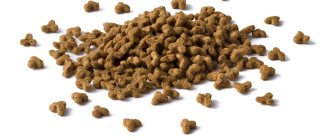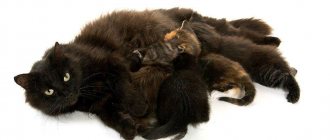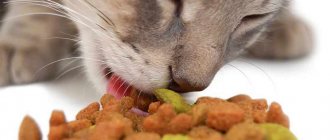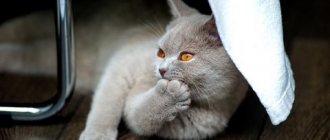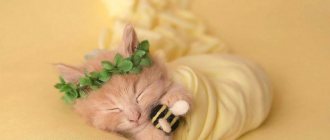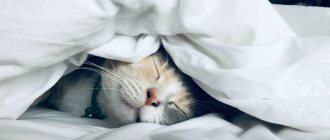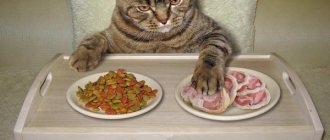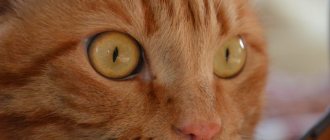Situations in which feeding problems arise
Most often, owners ask the question “Is it possible to feed a kitten baby food?” in a situation where, for some reason, the baby is left without a mother at too early an age. As a rule, a cat feeds its cubs with milk for up to two months. But there are cases when the mother abandons the baby, the kitten is taken from the breast early or given away by owners who do not care about the baby’s future. In this case, the new owner has a huge responsibility, because the life of a defenseless baby depends on how correctly the person feeds the kitten.
But even in a situation where a cat feeds its child itself, a caring owner should know that in order to better adapt to nutritious nutrition in the future, the baby should start feeding after three weeks of life. And after two months, when the pet’s milk teeth begin to appear, the mustachioed one will be able to gradually switch to solid food.
There are rare cases when an animal has an allergic reaction to cat food, and it is very difficult to balance the diet. Baby food will also come to the rescue. When feeding this way, it is necessary to carefully monitor the condition of the cat, its stool and behavior. Most often, such complementary foods help restore the intestinal microflora of a pet.
How often should I feed?
The frequency of feeding a kitten depends directly on its age. If the baby lives in the world only for the first week, then the mixture will have to be given to him every two to three hours. At the same time, remember that you will have to feed him even at night. A two-week-old kitten will eat a little more, but not so often: it will need to be fed once every four hours. At night, the baby will no longer wake up as often, so the frequency of night feedings will be reduced.
Three-week-old kittens are already stronger and more independent. They will need to be fed every five to six hours. It is also important to remember that kittens over twenty days old should be gradually taught to lap from a bowl. In addition, it will be possible to introduce complementary foods for kittens older than one month. During this period, it is important to monitor the small cat’s digestive system and its reaction to complementary foods.
Veterinarians' opinion
Is it possible to feed a kitten baby food? Veterinarians disagree on this issue, as well as on many other things. They claim that baby food is formulated for human babies, and babies and kittens have different diets and unique digestive systems.
However, much more important are the reviews of experienced cat owners who have tested the benefits of baby food for kittens in practice. The owners note the excellent health of their four-legged friends, their cheerful, playful mood, good appetite, and all this thanks to such complementary feeding.
Is it possible to feed a kitten baby food? If we take into account the beneficial effects of the product on the health and lifestyle of small pets, it is appropriate to give a positive answer. Kittens can and should be fed baby food.
Diet selection rules
Many veterinarians do not advise feeding fur babies first food, as it is formulated for babies. However, experienced cat owners claim that babies grow up healthy, playful, and willingly switch to adult food.
The following may appear in a kitten's bowl:
- liver – 2 times a month;
- beef daily;
- carrots, cauliflower;
- oatmeal, buckwheat, rice;
- low-fat kefir, yogurt, cottage cheese.
conclusions
Ready-made kitten food is a compromise. If you don’t have enough time to cook, baby puree or formula may appear on the animal’s menu. It is important to remember that you cannot feed your cat canned food all the time. Monitor your pet closely when introducing new foods.
Caring for kittens includes many important aspects: treatment, nutrition, care, organization of the living environment. Therefore, before purchasing a mustachioed friend, you need to weigh your options for providing a decent life for your pet. Today we will consider the most important questions regarding the nutrition of our four-legged animals, in particular: “Is it possible to feed a kitten with baby food?”
Features of feeding
It is important for owners to understand what kind of baby food can be given to a kitten. Not every formula is suitable for a baby. It is important to familiarize yourself with the composition of the product. You can feed the animal with both vegetable and meat mixture. The main thing is to avoid the following components in the finished product: salt, onion, garlic, starch. These elements are poorly digested and harmful to the cat’s body.
After the owner decides on the choice of complementary foods, the mixture must be diluted with boiled water in a 1:1 ratio. The kitten should be fed 3-4 times a day. You can use a pipette, syringe, or a special pacifier sold at a pet store. Simply carefully and slowly introduce the liquid into the animal’s mouth.
This is a painstaking and lengthy process, so the owner must be patient. The baby should be fed for at least 1.5 months. But do not forget that in the future the care shown for the kitten will return a hundredfold.
excellent food for cats that are fed natural food and those that are recovering from illness (+ photo)
Until recently, I didn’t know that cats simply adore “Tema” meat and vegetable puree. In fact, they are intended for feeding children from 8 months. But I have cats (two) who eat exclusively natural food (chicken, beef, turkey) and there’s a lot of fuss with preparing their food separately. but there are also fewer health problems than those who eat industrial feed.
So, after an illness, I had a weakened cat (one year old). She is not good at eating meat, because she quickly gets tired of chewing it, and I don’t always have time to process meat into minced meat. While I was treating her, I studied information about nutrition on the forums of cat breeders and discovered that those who feed animals with natural food use baby food such as “Tema”, “Babushkino Lukoshko”, “Gerber” and others in their diet (it’s only important that there are no potatoes, without pork and without fish. Important. Make sure that the composition does not contain onions, garlic, soy protein).
I decided to try it. I bought “Tyoma” puree with beef and buckwheat. It turned out to be excellent food for a cat. It bursts so you can't tear it off. Since it is puree and not a piece of meat, there is no need to chew it, and she does not get tired. Easily digested. Dietary (relatively of course). He goes to the toilet perfectly - without diarrhea, but also without constipation. I just started to recover at a rapid pace (pah-pah). He has a voracious appetite - he eats 2 jars a day and quickly regains the weight lost during illness. She eats it so much that she doesn’t have to persuade her (it’s apparently still hard for her to digest meat after her illness). One jar contains 100 grams of the finished product.
And what I like most is that usually I can’t force cats to eat, in addition to meat, vegetables and porridge (cereals - buckwheat, rice, etc.), but in the form of puree they crack “with a bang.” This is important because they also need carbohydrates, not just proteins. especially if the animal's kidneys are weak or diseased, then they need less protein.
The main thing is that it contains no lactose, preservatives, GMOs, flavors or dyes. and other rubbish. The composition is as follows: beef; buckwheat; sunflower oil, potato starch, table salt (but I tried the taste - the canned food is completely bland, there is very little salt in my opinion. Just what is needed for cats); dill extract, water. I think it's a good lineup! However, there is one small inconvenience: after opening the can, the product’s shelf life = 1 day. After this it cannot be used. Mine are great at persuading a whole jar in a day and more than one. So there is no problem with this. The manufacturer also recommends warming it up slightly. There is a catch here: if you reheat a portion and she doesn’t eat it all at once, then reheating is prohibited - all that’s left to do is throw it away if she doesn’t eat it.
I can tell you from my own experience - I DO NOT reheat it, it already smells like meat. I leave the jar to sit at room temperature (although these canned foods do not require a refrigerator) and serve it that way. They eat great. After heating in the microwave, these canned foods simply become more flavorful. This does not affect my cats in any way, since they eat it just fine without heating.
I highly recommend it to those who have cats on natural food and to those who are recovering from an illness.
Milk for kittens
According to most veterinarians, kittens should not be fed any milk other than cat milk. The baby's body produces a special enzyme that allows it to digest the mother's product - lactase. With age, the secretion of the enzyme is reduced to a minimum, and for the baby, milk becomes a heavy food.
If the mother cannot feed the kitten, it would be best to find a cat who is ready to raise someone else's cub. If this is not possible, the owner will have to find a worthy replacement for breast milk.
If the kitten has to be fed artificially, then store-bought dairy products are definitely not suitable for this. It contains many harmful substances that negatively affect the health of cats.
Cow's milk is one of the best substitutes for store-bought products, but it is not nutritious enough and is not rich in the vitamins and minerals necessary for the cat's body.
Goat milk for kittens will be the best option for feeding. It is more nutritious, the composition is enriched with microelements necessary for a growing pet. Goat's milk is absorbed faster by the cat's body than cow's milk. An additional advantage for the animal is that the product is low-allergenic. To feed a kitten, goat milk must be diluted a little with water.
Cat food developers also came to the rescue. In the pet store you can find special mixtures that are milk substitutes. The composition of such products fully corresponds to the composition of the milk of a nursing cat and will allow the baby to fully develop without feeling any discomfort from the substitution.
Caring for a newborn kitten without a cat
Caring for a newborn kitten
It doesn’t just come down to the fact that it needs to be fed regularly. In addition, full care is required, starting from the moment the umbilical cord connecting the tiny body to the mother was cut. If it so happens that the cat is not nearby, then the babies will need to be provided with warmth and food. It is important to feed the babies earlier - the baby will not die without food for several hours after birth, but there may be problems with the underdevelopment of the sucking reflex, and the digestive functions will not begin to work as they should.
In the nest with kittens, the temperature is maintained at 28-30°C. An excellent choice would be a cardboard box measuring 50 by 50 cm. Up to 14 days - until the eyes begin to open, the box is closed. After this, the lid is not needed, but you should not immediately take the babies into bright light.
If the kittens are not located in the center of the box, but in the corners, it means they are cold, and heating pads with boiling water are placed around the nest.
You also need to regularly inspect and wipe with a linen rag, symbolizing washing by the mother. With such care and attention, future cats will grow up healthy and affectionate.
What food is suitable for Scottish kittens?
Are you the proud owner of a Scottish kitten and are wondering what food is best for your pet? The fact is that for the harmonious development of a baby of any breed, the features of choosing food are the same.
Today there are many developers of food for cats. Store shelves are bursting with an abundance of products. In such conditions it is easy to get lost. But the choice of manufacturer should be taken extremely seriously. Ready-made food for Scottish kittens must be balanced and contain all useful vitamins, minerals and trace elements. To do this, before purchasing a product, you need to study its composition. The main condition for high quality feed is the meat content in it. This ingredient should be in the first place in the composition. If everything is in order with this, then we study the vitamin content.
It is recommended to choose super-premium and holistic food for Scottish kittens. Each manufacturer's product line includes products in this category, but the developers themselves are different. In any case, your cat should evaluate the food you choose. If he feels good after eating, then the product is suitable for him.
Meat in Scottish kitten food
Like all kittens, Scots are ready to eat meat products by 1.5–2 months. Meat baby food for a Scottish kitten - meat puree, canned food, stew. When purchasing a product, you should also pay attention to the composition. Naturally, the food should contain a large amount of meat. But dry formulations containing meat can be consumed by a kitten after 6 months. In any case, no matter what product the pet owner chooses, the animal should like the food. It is important that it does not cause allergic reactions. Then the kitten will grow up strong, healthy and will delight its owner for many years.
